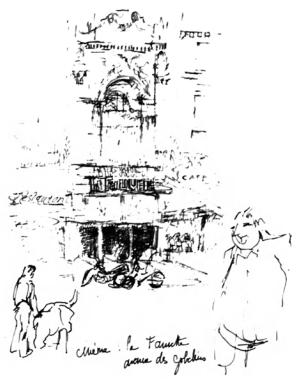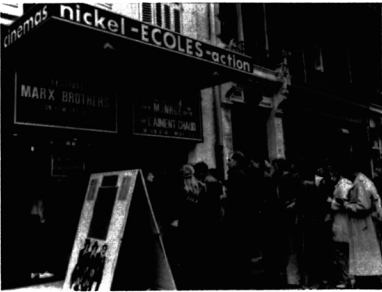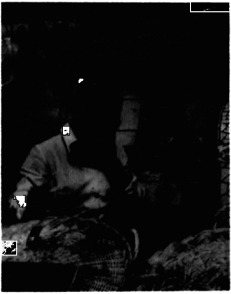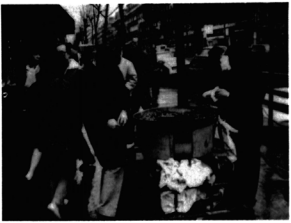16.1: Dialogue
- Page ID
- 142365
Dialogue
Un vernissage. We are at a (supposedly) private viewing at an art gallery.
| Une foule de personnes se presse autour des tableaux de l'artiste Toto que l'on fête aujourd'hui. Mais où est l'artiste? S'est-il peut-être absenté pour aller au cinéma de la Faucette? | ||
| Un homme qui sirote0 du champagne depuis plus d'une heure et une grosse dame qui est en train de se bourrer0 d'amuse-gueules0 se trouvent en face d'un tableau intitulé: "Impression coucher de lune." | 0 (FAM) has been sipping 0 en...has been stuffing herself/cocktail snacks |
|
| MME DE BOUFFIX | Ah, cher monsieur, le pouvoir qu'exerce ce tableau sur mon âme0 est inexprimable. Mon coeur est touché et je ris et je pleure tellement ce tableau exprime-t-il votre génie, je vous en félicite. En regardant vos yeux j'y vois brûler le même feu que dans les couleurs de vos toiles0. Permettez donc à une humble admiratrice qui croyait que l'art moderne n'avait plus rien à lui révéler de vous serrer la main avec chaleur et de vous exprimer toute son admiration. | 0 soul 0 canvases (paintings) |
| M. DE PINARD | Très chère madame, vous me flattez et m'honorez, mais... ce n'est pas moi, l'artiste. Je dois malheureusement vous détromper0. Moi, je ne suis ici que pour boire du champagne... gratuitement0. | 0 undeceive 0 free (without paying) |
| MME DE BOUFFIX | Monsieur, vous me choquez et votre attitude est inexcusable vouloir me faire croire que vous étiez l'artiste. Moi, je ne parle qu'aux gens cultivés, pas aux gens communs. Mais où alors est Toto, l'artiste? | |
Dialogue
| Les activités culturelles du week-end. Une discussion entre amis. | ||
| VALÉRIE | Moi, hier soir, je suis allée à un vernissage0. F-a-n-t-a-s-t-i-que. L'artiste a su exprimer une étonnante mélancolie parfois même ésotérique. Je vibre0 encore, tellement j'ai été impressionnée par ces toiles0. | 0 private showing (of an artist's paintings) 0 shiver (am stirred) 0 canvases |
| GÉRARD | Moi, par contre, je suis allé au spectacle: une pièce de Pinget; en un mot, une expérience s-u-b-l-i-m-e. | |
| CONSTANCE | Le moderne, c'est pas mal quoique je préfère le classique. Qu'y at-il de comparable à une symphonie de Beethoven, un ballet du grand Balanchine, un opéra de Verdi? Ne trouves-tu pas, Albert? | |
| ALBERT | Euh...oui, bien sûr, vous avez raison tous les trois. | |
| GÉRARD | Et quelle est l'expérience culturelle à laquelle tu t'adonnes0 passionnément en fin de semaine? | 0 give yourself over to |
| [Valérie, Constance et Gérard se taisent0 et regardent Albert en attendant une réponse.] | 0 stop talking | |
| ALBERT | Euh, euh, mmh...[il s'éclaircit0 la voix] moi, je passe mon temps...mmh, mmh, à regarder des bêtises à la télévision. | 0 clears |

Exercice I
Invent two or three statements in which you decry the lack of intellectual curiosity on the part of others. (We say "invent," because naturally none of our students says anything like this as standard practice.) It is okay to mention American or British authors that you read or other topics that are more familiar to American audiences.
Grammar Notes: The grammar notes appear ahead of the next set of Questions et réponses exercises because all the constructions are review constructions. Reread the material on interrogative pronouns and interrogative adjectives, then treat the exercise sentences as illustrations (we've tried to make them interesting). Read Reference Grammar, 1.6. 1.6.1, 1.6.1, and 2.2.6 before continuing.
Questions et Réponses
A. Who? / About what? / What affair?
- —Qui est à la porte?
- —C'est moi, Paul Deroux.
- —Et qui êtes-vous?
- —Je suis votre voisin du quatrième étage, je voudrais vous parler.
- —Et de quoi voulez-vous me parler?
- —Euh, vous comprenez, c'est une affaire délicate.
- —Ah, oui? De quelle affaire s'agit-il?
- —Monsieur, il faut comprendre, je ne peux pas vous le dire ici.
- —Dommage. Au revoir, monsieur.

B. What did you do? / With whom? / What do they serve?
- —Qu'est-ce que tu as fait hier soir?
- —Je suis allée à un nouveau restaurant rue Mouffetard.
- —Tiens. Avec qui y es-tu allée?
- —Avec Jean-Paul. Il m'a invitée.
- —C'est gentil. Et qu'est-ce qu'on sert dans ce restaurant? C'est encore un restaurant grec?
- —Non, c'est un restaurant typiquement français. On sert des plats régionaux.
- —Et quelle est la nationalité des chefs, des garçons?
- —Pour la plupart ce sont des chinois et des vietnamiens.
- —Alors ce n'est pas typiquement français, c'est peut-être typiquement parisien.
Exercice II
Disappointed that we didn't supply examples of all uses and forms of the interrogative pronoun and interrogative adjective? Let's do something about that. You make up three short dialogues, starting each one with a form or a use that we have not covered. After that you may reuse forms/uses. For example, why not start with "Qu'est-ce qui est sur..."?
CROIRE, to believe, to think
| Je crois que oui. | I think so. |
| Tu crois qu'il est fou? | You think he's crazy? |
| Elle croit en Dieu. | She believes in God. |
| Nous croyons à ses promesses. | We trust his promises. |
| Vous croyez ça? | Do you believe that? |
| Ils croient que non. | They don't think so. |
| Passé composé: j'ai cru, ... | (= "at that moment, I came to believe") |
| Imparfait: je croyais, ... | (the state of the subject's mind at some time in the past) |
| Futur: je croirai, ... | Futur proche: je vais croire, ... |
Grammar Notes: Again, some grammar notes preceding an exercise. The subjunctive is found (1) in subordinate clauses introduced by que and dependent upon a specific set of verbs, verbal expressions, adjectival expressions, and (2) in clauses introduced by a specific set of conjunctions (all of which contain que). The conjunctions used in Exercice III are the only ones we expect you to be able to produce. (See Reference Grammar, 7.3.2g.)
Exercice III
Complete each sentence in a way that demonstrates you understand the meaning of the first part, particularly the meaning of the conjunction. Write each sentence completely on a separate piece of paper. Remember: every sentence takes the subjunctive; also, the subject of the afin que or pour que clause cannot be the same as the subject of the main clause (we illustrate that in the first sentence).
- J'ai envoyé un télégramme à mes parents afin qu'ils...
- Je te crois bien que...
- Attends. Je vais chercher mon fils pour que...
- Les étudiants vont attendre jusqu'à ce que...
- Bien, je vais t'aider quoique....
Grammar Notes: Here we go again, notes first. For quite some time you have been hearing, seeing, and even using the construction that is called the "verb + complementary infinitive." Also, once again, the apparently difficult aspect of this construction is not really a grammatical question, but a lexical one. Some verbs take à, some de, and some no particle before the complementary infinitive. (See Reference Grammar, 12.1a.)
The workbook has some fairly straightforward exercises to give you practice with this construction. The following exercise is intended to help you develop a system for testing yourself on the vocabulary problem (that is, which verb takes which preposition).
Exercice IV
Answer each of the following questions using the words given in parentheses. Be sure to check the main verb (the first one in the parentheses) to see whether or not it takes a preposition (particle) after it, and if so, which one. Write your answers on separate paper.
Model: Pourquoi êtes-vous venu ici? (vouloir/vous/parler)
Je suis venu parce que je voulais vous parler.


- Que fait votre professeur de piano? (me/enseigner/jouer/piano)
- Et Jacques, qu'est-ce qu'il peut faire? (vous/aider/réparer/voiture)
- Si nous ne travaillons pas, qu'est-ce qu'il va faire? (décider/vous/donner/mauvais/notes)
- Pourquoi les avez-vous applaudis? {réussir/terminer/cours de français)
- Pourquoi est-ce que les enfants aiment le boulanger? (leur/permettre/manger/ pain d'hier1 avec leur chocolat)
- Comment savez-vous que Richard est courageux? (oser/contredire/professeur)
- Tu as lu la lettre de tes parents? Qu'est-ce qu'ils disent? (me/conseiller/ne plus/sortir/avec toi)
- Tes étudiants comprennent maintenant? (Non, mais/commencer/comprendre/ quelque chose)
1 "Yesterday's bread" (pain d'hier) is, of course, rather stale because the boulangers do not use preservatives such as are found in our packaged breads The French often use left-over bread in the morning, for tartines, and schoolchildren love it with chocolate.
Exercice V L'Adjectif, Récapitulation
Answer the following questions, supplying appropriate adjectives, in as great variety as possible. Use the vocabulary lists in the Intégration units for ideas.
Modèle: —Tu as un nouveau prof? Comment est-il?
—Ce n'est pas un homme, c'est une femme, et elle est très intelligente et très sympa.
- Qu'est-ce que tu as acheté hier? (voiture)
- Décrivez votre meilleur ami. (C'est. . . un/une garçon/jeune fille. . .)
- Où habitent vos parents? (Ils habitent à C***. Ils ont. . . maison. . .)
- Quelles sortes de fleurs aimez-vous?
- Quelles sortes d'examens préférez-vous?
- Qu'est-ce que tu vas me donner?
Lecture
The following excerpts are taken from the novel Jean de Florette, by Marcel Pagnol, on which the film of the same name is based.
In the first excerpt, Ugolin and his uncle, César Soubeyran (called Le Papet), are discussing the land that Ugolin wants to use for growing flowers commercially. The major problem in this area is finding a reliable, consistent source of water. Le Papet tells his nephew they should be able to buy some land from an old man who doesn't realize (or care) that there is a good spring (une source) on his land. Le Papet speaks first:
| —C'est à Massacan que tu veux planter? | |
| —Bien sûr, dit Ugolin. Là-haut, c'est abrité0 du vent, et c'est de la terre à fleurs, je te l'ai prouvé. | 0 sheltered |
| —Eh bien moi j'ai une idée. Si on achetait le champ et la source de Pique-Bouffigue, aux Romarins, trois cents mètres plus haut que toi? | |
| —Elle a encore de l'eau, cette source? J'en ai entendu parler par mon père, mais il disait qu'elle était morte. | |
| —Elle est plus qu'à moitié bouchée0, ça c'est sûr. Il2 ne cultive rien, il ne boit que du vin, et il ne se lave jamais. Mais quand j'étais jeune, c'était un joli ruisseau0, et son père, Camoins le Vieux, faisait des pleines charrettes de légumes. Peutêtre qu'avec quatre coups de pioche0... | 0 plus...more than half stopped up 0 stream 0 pickax |
| —Tu crois qu'il vendrait sa ferme? | |
| —Pas la maison, bien sûr. Mais peut-être le champ et la source. Il n'en fait rien, et il n'en fera jamais rien. Si on lui fait voir des sous0... | 0 fait. . . show (him) some money (LIT: make (him) see) |
2 The pronoun il here refers to the old man who owns the land that le Papet wants to have Ugolin buy.
In this second excerpt, le Papet and Ugolin are at the town bar, joining with the other men in this small town who have just attended the funeral of the man who owned the land and spring that Ugolin wanted to buy. (Le Papet had caused the old man's death: accident, but not reported—for obvious reasons.) They are trying to determine how they can obtain the land from the heirs without paying too much. They certainly don't want anyone to know there is a good spring there. "Old" Anglade is one of the old man's relatives, but he says there is a closer one, who has been notified. Le Papet remarked that the poor person was not inheriting anything much, and another person, le Boulanger, has just talked about how dry it was on that land.
| —Ça, c'est possible, dit Anglade, seulement, ce que vous ne savez peut-être pas, c'est que chez Pique-Bouffigue, il y a une source... | |
| Ugolin parpelégea0 trois fois. | 0 jumped nervously |
| —Il y avait une source, dit le Papet. | |
| —Moi, dit Anglade, je l'ai vue. Elle était très belle, puisqu'elle faisait un petit ruisseau, large comme la main d'un homme. | |
| —Moi aussi je l'ai vue, quand j'étais petit, à la chasse0 avec mon père, dit Pamphile. Ça m'avait semblé un vrai ruisseau! | 0 à...(while) hunting |
| —Tu devais être bien petit, dit le Papet, et c'était sûrement après un orage0. Parce que moi j'y ai bu, il y a peut-être quarante ans. Ça coulait gros comme mon doigt. Mais depuis, elle s'est perdue. | 0 storm |
| —Tu crois que ça peut se perdre, une source comme celle-là? | |
| —J'y ai jeté un coup d'œil0 ce matin, répliqua le Papet: c'était sec comme de l'amadou0. La vérité, c'est que ce fainéant0 de Pique-Bouffigue ne s'en est pas occupé, elle s'est bouchée, et alors, elle s'est fait un passage en dessous0: elle a plongé, va savoir jusqu'où0? | 0 coup...glance 0 tinder/good-for-nothing 0 en...below 0 va ...who knows where |
| —Si on faisait un puits0? dit Casimir. | 0 well |
| —Tu perdrais ton temps! dit le Papet. Cette eau, elle devait venir de la Profondeur0. Quand les saletés0 l'ont empêchée0 de remonter, elle s' est fait son passage dans la Profondeur. Peut-être à trente mètres, peut-être à cent mètres. Je le connais, moi, le caractère des sources. C'est comme une belle fille. Quand on les oublie, elles s'en vont, et c'est fini. | 0 Depth3/mess/prevented |
3 Le Papet stresses how far down the water must be.
In this final excerpt, le Papet and Ugolin are talking alone again. They have learned that a certain Florette, an older woman, has inherited the land. Le Papet knows her and is certain she'll want to sell, so they are to wait (not let her know they are interested) and buy it when no one else will buy it—thus for a lower price. Ugolin is worried that someone else will buy it, some "foreigner." The wise le Papet asks:
| —Et qu'est-ce qu'il viendrait faire, cet étranger? | |
| —Des légumes verts, ou même peut-être des fleurs! Comme moi! A cause de la source! | |
| —Eh, oui, dit le Papet. Nous y sommes. A cause de la source. Mais s'il n'y avait pas la source, qu'est-ce que ça vaudrait? | |
| —Rien, dit Ugolin. Rien. Mais elle y est. | |
| —Le Papet mit sa pipe à la bouche en souriant, puis il cligna de l'œil0 malicieusement, et prit tout son temps pour allumer la perruque de tabac0. Enfin, il dit à mi-voix: | 0 cligna...winked 0 la... = le tabac |
| —Elle est déjà bouchée aux trois-quarts. Et si, par ACCIDENT, elle se bouchait complètement? | |
| Ugolin, perplexe, demanda: | |
| —Quel genre d'accident? | |
| —Suppose, dit le Papet, que tu passes près de la source, avec un sac de ciment sur le dos. Tu glisses, tu tombes, et le ciment va tout juste boucher le trou!... |
Common and Uncommon Knowledge
- Que mange un gorille qui pèse 300 kilos?
- Quand c'est l'hiver en France, quelle saison est-ce en Australie?
- Qui a inventé la lampe électrique?
- Où se trouve le Luxembourg?
Vocabulaire
NOMS
| un champ | field |
| le ciment | cement |
| un légume | vegetable |
| une note | grade (in a course) |
| un orage | storm |
| un plat | dish (course in a meal) |
| un plat régional | regional dish (specialty of a region) |
| une promesse | promise |
| un ruisseau | stream |
| une source | spring (water) |
| un télégramme | telegram |
VERBES
| applaudir | to applaud, clap |
| conseiller | to counsel, advise |
| contredire | to contradict |
| croire | to believe, think |
| enseigner | to teach |
| entendre parler de | to hear about |
| oser | to dare |
| planter | to plant |
| prouver | to prove, demonstrate |
| réparer | to repair |
ADJECTIFS
| fou, folle | crazy |
| large | broad, wide |
| sec, sèche | dry |
ADVERBES
| malicieusement | maliciously |
| pour la plupart | mostly |
| typiquement | typically |
PRÉPOSITIONS
| à cause de | because of |
| chez | at the home/place of |

